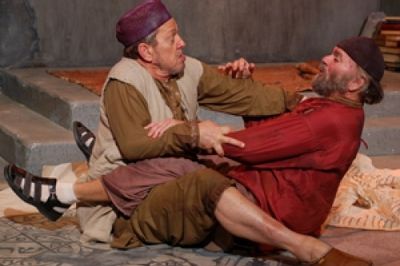The show playing at the Unicorn Theatre until March 27 -- Two Jews Walk Into a War -- is part current events, part history, part theology lesson, and part vaudeville routine. Set in Kabul, Afghanistan, it tells the story of two old Jewish men hiding from the Taliban in a makeshift synagogue. Zeblyan (played by Robert Elliott) is an angry, rebellious fighter. Ishaq (played by Jim Korinke) is a quieter, more pious man. The two cannot stand each other, and their mutual friend, who was the only thing keeping them separated, has been killed.
The death of their friend brings home the point that the two mutually loathing men are the last two Jews in the city. So they must decide whether to leave and go elsewhere in the world or make a stand where they are and try to renew the Jewish population in the face of intense religious discrimination.
Realizing that they cannot attract Jews without a proper synagogue and that they need an official Torah to attract a rabbi, the two best enemies attempt to team up and write down the Torah from memory.
The script has a little trouble establishing itself at the beginning. At first, I thought perhaps this was a lost script for another Walter Matthau and Jack Lemmon movie -- Grumpy Old Men in a Synagogue. Some of the banter between the men was reminiscent of Abbott and Costello, and some of the background gunfire was timed suspiciously, sounding like rimshots instead of distant violence.
After about 30 minutes, however, when the men settle into their mutual task, the script's clumsiness begins to fall away and the real issues are allowed to surface. The two men grapple with the fact that Jews historically have been moving from place to place, harassed or killed (or enslaved) wherever they go. They must confront the question of "When is it smart to stand up for yourself, and when is it better to just move on?"
That issue looms large over the whole show, but there are other problems along the way, too. For example, during their painstaking process of writing the Torah by hand, they have ample time to reflect on its meaning. The play shows the real danger for faith when people begin to actually read and understand what scripture says: it often doesn't make a lot of sense.
Two real strengths of the play are its sense of authenticity and the way it makes the audience take a more global view of current issues. Although we Americans like to consider ourselves the Center of All Things and consider groups like the Taliban as being focused solely on blowing us up, this play shows us something different: The Taliban are concerned with their own way of life, and not everything they do is about us. They like to destroy more than just Americans.
Two Jews Walk Into a War fuses larger philosophical issues with actual things happening in the world. I wish my history classes had been as engaging as this play is.
